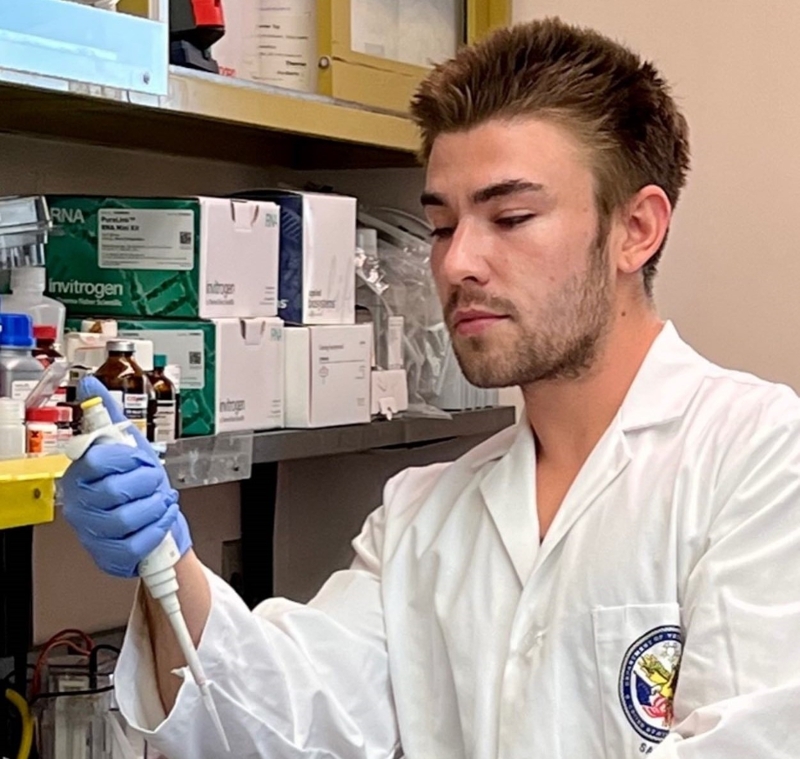I Am a Researcher & Goldwater Scholarship Winner!
Matthew Uzelac

Majors: Neurobiology (B.S.) & Biochemistry (B.S.)
College: Seventh
UC San Diego graduation year: 2024
The Goldwater Scholarship awards up to $7,500 to sophomores or juniors in engineering, natural sciences, or mathematics to support their research project.
How did you hear about the Goldwater Scholarship?
I heard about the Goldwater Scholarship from my P.I., Weg. Ongkeko. Several of my lab members who I greatly admired had won this award in the past, so I was very honored to hear that my P.I. thought I might be a strong contender, too.
What interested you in applying for it?
I published three research articles in the year before I applied. I was very proud of these works, and they definitely influenced my decision to apply. I considered myself a much stronger candidate after doing so.
How was the application process?
The application wasn’t too daunting! So long as you grant yourself enough time for drafts and revisions, it’s very doable. It does require a few letters of recommendation, preferably written by those who can speak to your work in research. I was fortunate to have collaborated with a few of my P.I.’s colleagues, who were very willing to write letters.
How has (or will) the scholarship benefited you?
Being named a Goldwater Scholar was highly validating of my work in research. As I wrote above, research can sometimes feel frustrating or even insignificant. It was meaningful to hear an account of my work from such a prestigious foundation. I’m also very proud to boast the Goldwater Scholarship on my resume, and hope that it will serve me well on my graduate school applications.
What advice do you have for others interested in applying for this scholarship (or others)?
I would advise others to begin the application early! Your research proposal and personal question answers will drastically improve with each draft, so it’s important to allow time for revisions. Other than this, I would say to not be afraid of applying. There aren’t exactly consequences of choosing to apply and not being selected. The time and effort you expend will only serve to make any future applications of yours that much stronger!
- URS Eureka! Summer 2021
- URS Julia Brown Summer 2022
- TRELS Winter & Spring 2023
- Genentech Scholars Summer 2023
What are you researching (or did you do in the past)?
I conduct oncology-based research spanning a fairly wide array of cancer types. With use of bioinformatics and data science, a majority of my works investigate microbiological influences as they pertain to these cancers. I’ve studied bacteria, fungi, viruses, and even archaea for their implications in cancer diagnosis and prognosis.
Why and how did you decide to get involved in undergraduate research?
I didn’t have much exposure to research before the start of my undergraduate schooling. I was allured by UCSD’s impressive research standings, particularly in neuroscience. As a freshman, I was curious about the world of medicinal research so I began to look into the works of several labs at UCSD that I found interesting. I was very fortunate to have found my current lab, of which I’ve been a member of since the start of my freshman year. There was quite a steep learning curve, but I’m very grateful for how much I’ve learned from my lab in these past few years.
What did you gain from this program/experience?
The URH programs have definitely furthered my passion for research. Beyond the professional development opportunities offered by these programs, the social connections are really special. It’s really nice to meet so many other undergraduates conducting research similar to mine.
What advice would you give to students starting research?
My biggest piece of advice for undergraduates is that they should allow themselves enough time within any single lab to truly progress. I’ve noticed that research can often be frustrating, so it’s important to minimize any forms of discouragement. As they become more accustomed to their labs and their labs’ procedures, the research is sure to become exponentially more enjoyable.
